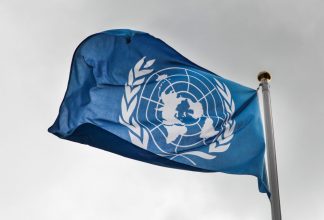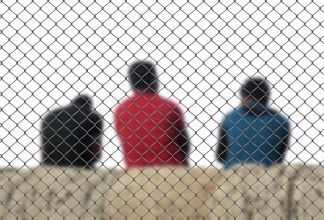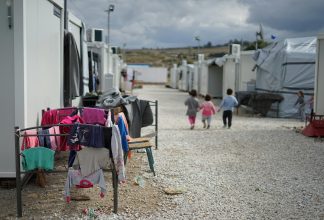Cutting Aid to Support Refugees will Allow Extremism to Thrive
Civil Rights Defenders Op Ed in The Guardian, November 23:
News that Sweden and Norway are considering cuts to their international aid budgets in order to use the money to support refugees is of concern to advocates of democracy and human rights around the world, particularly those working in repressive environments.
The need to welcome unprecedented numbers of refugees and facilitate their integration is not only noble but also obligatory under international human rights law. But meeting this need should not weaken international efforts to bolster democracy and human rights. Sweden and Norway have been global leaders in this field.
Clearly, some tough choices have to be made. But where possible, the choices should not erode the gains and hopes that Sweden and Norway have helped to incubate.
It is well known that Norway and Sweden (along with Luxembourg) spend a higher percentage of gross national income on development aid than any other members of the Organisation for Economic Cooperation and Development. What is less known – but just as important – is how much goes to civil society. Roughly one-sixth of Sweden’s aid budget, for example, funds this cause directly, including support for those working on democracy-building and human rights.
Globally, there is perhaps no sector more imperilled than the independent human rights and democracy sector – a fact that Norway’s government acknowledged in a white paper last year. Around the world, countries are using laws and state harassment to intimidate and silence activists. In fact, the timing of the proposed cuts could not be worse: globally, civic space is shrinking at an alarming rate.
Activists are stigmatised as “foreign agents” in Russia and have been branded “evil society” in Kenya. In Ethiopia, they have been driven off the map, while in Azerbaijan, Bahrain and Venezuela they are jailed. They face continuous harassment in Kazakhstan and Vietnam, are under surveillance in the UK, and get hounded by tax authorities in Canada and India. Nor is that all.
Activists have come to depend on Sweden and Norway to enable them to keep fighting for the universal values enshrined in international human rights law. A few others – including Finland and some independent foundations in the US and UK – provide support for this risky, difficult and often frustrating work. But many donor countries tend to channel the bulk of their development aid directly to governments, forgetting that the best guarantor for democracy and development is the demand side – via a strong and vibrant civil society – rather than the supply side, via the state.
Democracy funding, especially when it goes directly to activists, allows people to dream, organise, and take a stake in their societies. Reducing this support would decimate civil society and send the wrong message to repressive regimes.
The consequences of a weakened global civil society movement could ultimately come back to haunt Sweden and Norway. Funding independent civil society in other countries is not just altruistic, it can also help to ensure that a refugee crisis does not happen again. People are less likely to leave places that enjoy long-term peace, accountability and stability, since these factors accelerate development.
If they cannot participate peacefully in society, people are more likely to find non-peaceful ways to make their voices heard. Extremism thrives in such environments.
This is what we have seen in Syria, Libya and elsewhere. Opposition and dissent were long repressed, impeding the growth and maturity of civil society. Instead, extremism flourished and these countries imploded, contributing to the refugee crisis. Extremism outside Europe can also affect the continent, as the attacks in Paris so vividly illustrate.
In Tunisia, civil society – including trade unions and non-governmental organisations – was more developed than in most other places in the Arab world. It has been indispensable to the relative, albeit uneasy, stability. In recognition of this key role, a coalition of civil society groups was awarded the Nobel peace prize this year.
The international community should be giving more support, not less, to these types of movements. Today’s refugees may be from Syria, Afghanistan, Iraq, Eritrea and elsewhere, but tomorrow’s could come from other countries where Sweden and Norway currently support democracy and human rights groups.
Take Cambodia, a country plagued by war, genocide and internal strife for several decades. It still lacks reliable rule of law – as the current political crisis illustrates – but it does have a vibrant civil society to check government power. Cambodia relies heavily on Swedish and Norwegian assistance, and significant cuts could threaten more than 20 NGOs defending human rights.
The refugee crisis is the culmination of a series of long, complex problems in multiple countries. Instead of focusing only on the end result of these problems, Sweden and Norway should continue to emphasise the root causes by helping to build democratic, prosperous and stable societies that people will not want, or need, to leave.
Cutting international aid – especially the money that goes to civil society – is not a wise long-term strategy. Alternative solutions need to be found. This will not be easy, but democratic movements worldwide are depending on success.
Robert Hårdh, Executive Director, Civil Rights Defenders
Maina Kiai, the UN special rapporteur on the rights to freedom of peaceful assembly and of association
Thomas Hammarberg, former Council of Europe commissioner for human rights
Jan Axel Nordlander, former Swedish ambassador for human rights
Bjørn Engesland, secretary general of the Norwegian Helsinki Committee


